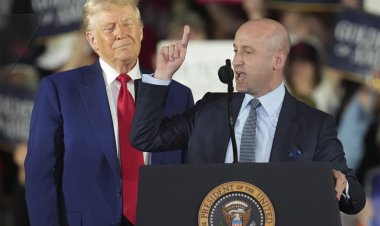Dems send landmark climate, tax and health care bill to Biden’s desk
Now a party that has struggled at sales pitches must sell the climate, tax and health care vision that it finally managed to pass.

Democrats have notched their biggest victory since taking full control of Washington 19 months ago. The November fragrance of their late political bloom remains to be seen.
Every House Democrat on Friday evening gave final approval, along party lines, to a health care, climate and tax bill, delivering on a key campaign promise of Joe Biden’s presidency and capping more than a year of talks on the Hill.
The legislation represents the largest investment in addressing climate change in U.S. history, allows Medicare to negotiate with pharmaceutical companies on the costliest prescription drugs and extends health care subsidies through the 2024 election. Biden is expected to swiftly sign the bill.
Minutes after voting, progressive Rep. Chuy García (D-Ill.) summed up the day like this: "Just when you thought nothing big would happen, turned out that something big could happen ... it's a great day."
Republicans sharply opposed the package, which is financed largely by tax increases on large corporations and would reduce the U.S. deficit over time, according to nonpartisan analysis.
“I’ve been saying for a long time now that Joe Biden is to this country what Harry Truman was back in the 1940s,” House Majority Whip Jim Clyburn (D-S.C.) said, while acknowledging that the bill isn’t everything Democrats wanted: “But I’ve always said a half loaf is better than no loaf. You come back and get the other half if we can have a successful election in November and get the numbers we need.”
House Democratic Caucus Chair Hakeem Jeffries (D-N.Y.) was more blunt in his Friday floor speech: "It's a big effing deal."
Of course, it’s uncertain whether one bill is enough to turn around the historic headwinds and inflation angst that have put the House majority out of reach for Democrats this fall and imperiled their control of the Senate, according to most polls. And the party must now sell the bill to voters who won’t see much of its benefits for years — not to mention its own progressive base, where there’s keen awareness of how many priorities got dropped.
Even so, three months before Election Day, many party lawmakers are the most upbeat they’ve been in months about their chances to defy, or at least temper, the GOP’s advantage.
“I do think we have a really good story to tell. And we need to sing it from every rooftop over the next couple of months,” said Congressional Progressive Caucus Chair Rep. Pramila Jayapal (D-Wash.).
Democrats walked a winding and occasionally treacherous path to this moment, pressing past months of internal tension between liberals and centrists over the scope of the bill once called "Build Back Better" and now redesigned as the "Inflation Reduction Act." Now that their legislation is on the verge of becoming law, the terrain ahead could be similarly tough without an aggressive push to promote it.
Lawmakers have already warned that the party's previous sales jobs, such as last year's effort to promote the $550 billion bipartisan infrastructure law, fell flat.
And privately, many Democrats are looking to Biden for a clearer plan this August — perhaps even the kind of nationwide tour that never happened to promote Obamacare a decade ago. Biden's administration has pledged to House Democrats that they’ll dispatch Cabinet officials to barnstorm during this month's abbreviated break from Washington.
But such plans for the president have yet to be announced as he embarked on a week-long post-Covid vacation in South Carolina.
Whatever messaging Democrats mount to tout their bill will compete against a bevy of GOP attack ads targeting their vulnerable incumbents in November. So far, Republicans are feeling most confident about their attacks on the bill's credits designed to promote “luxury” electric vehicles; Democrats slam that as a lie, since only people below certain income levels will qualify for the credits.
Top Democrats, meanwhile, argued the party-line bill wasn’t designed to protect their majorities this fall. Asked about whether it would help the party in the midterms, Speaker Nancy Pelosi insisted that the bill's policy measures are most important: “This probably could be helpful [in November], I don’t know. But I do know that it will be helpful to America’s working families and that’s our purpose.”
When the Dems officially got the votes, a huge group of activists outside the Capitol burst into cheers. Earlier, Democrats including Reps. Jamaal Bowman (D-N.Y.) and Sharice Davids (D-Kan.) were running up and down collecting high-fives from supporters
Pelosi and her leadership team rounded up every single Democrat to back the package, a notable achievement for the sprawling caucus. Two moderates that leadership was most concerned about — Rep. Jared Golden (D-Maine) and Rep. Vicente Gonzalez (D-Texas) — both ultimately voted yes.
The removal of a narrowed tax break for investment managers known as carried interest, at the behest of Sen. Kyrsten Sinema (D-Ariz.), "angers me," Golden said in an interview before the Senate passed the bill on Sunday. "At least they’re not doing" the repeal of limits on state and local tax deductions, he added. "I’ll give 'em credit for that."
Extended subsidies for insurance buyers under the Affordable Care Act had been a key priority for a group of moderate Democrats who worried that, without action by Congress this month, insurers would start warning of price hikes just before the midterms.
The bill's health care provisions — including allowing the U.S. government to negotiate the costs of the priciest drugs in Medicare — are among its most popular elements, according to polls. But the negotiated prices won't start to kick in until 2026, underscoring the dilemma for Democrats.
“One of the top issues we hear from folks is the cost of prescription drugs. I think people have been talking about that for years and wanting to see progress there,” said Rep. Suzan DelBene (D-Wash.), who chairs the moderate New Democrat Coalition, urging her party to make health care one of its chief selling points for the bill heading into November.

The GOP has focused its attacks, so far, on charges that the bill's spending will spark higher taxes and inflation at a time when spiking prices remain a major concern for voters. They’ve also hammered Democrats over the bill's new Internal Revenue Service funding to hire additional enforcement personnel, which they say will result in more tax scrutiny for regular Americans. Democrats counter that the increased IRS enforcement will focus on large corporations and wealthy Americans.
"Do they not understand the concept of pouring gas on the fire?" said Rep Bob Good (R-Va.), who railed against the bill in a floor speech and then proceeded to argue that climate change was a "hoax," that fossil fuels are "a wonderful thing" and that Democrats wanted to hire thousands of armed IRS agents.
The speech prompted a raucous rebuke from House Budget Chair John Yarmuth (D-Ky.), who called the remarks "lies."
But in the battle over lower health care costs, Democrats have their own midterm pitch to go up against Republicans' inflation-minded message heading into November.
“I wouldn’t want to go home and explain to my constituents why I voted against lowering their prescription drug costs. If they want to do that, if that’s their platform, then have at it,” Rules Committee Chair Jim McGovern (D-Mass.) said.
“November is a long time away,” he added. “But clearly I think this is something that’s very, very popular.”
Christopher Cadelago contributed to this report.












